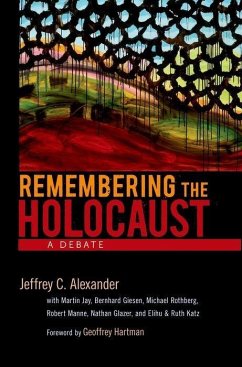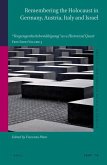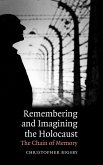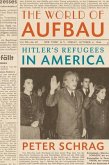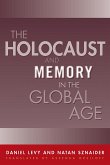The meaning of the Holocaust and how it should be remembered has been the subject of much intense public debate. Should its significance be limited to particular groups or are there lessons for all of humanity to draw upon?
This book brings together a wide range of leading historians, social scientists, and literary scholars to explore the controversy surrounding the legacy of the Holocaust. Jeffrey Alexander's award-winning essay, "On the Social Construction of Moral Universals: The 'Holocaust' from War Crime to Trauma Drama" traces how the Holocaust gradually became the dominant representation of evil, and what the consequences have been for the development of its universal moral relevance. Through this
cultural transformation from a specific, historical event into a generalized symbol, the Holocaust is now the standard for evaluating the evil nature of other acts. While this extension, or bridging, to other events potentially opens the door to the understanding and condemnation of atrocities across the
globe, the routine evocation of the Holocaust may also deprive the event of its meaning, leading to political manipulation, trivialization, and even forgetting.
His inquiry is joined by essays from Martin Jay, Nathan Glazer, Elihu and Ruth Katz, Michael Rothberg, Robert Manne, and Bernhard Giesen, who further debate the geopolitical, national, and cultural limits and dangers of extending the tragic lessons of the Holocaust. This thoughtful and controversial book will be a welcome addition to the wider academic and public debate continuing around the legacy of the Holocaust and its meaning.
Hinweis: Dieser Artikel kann nur an eine deutsche Lieferadresse ausgeliefert werden.
This book brings together a wide range of leading historians, social scientists, and literary scholars to explore the controversy surrounding the legacy of the Holocaust. Jeffrey Alexander's award-winning essay, "On the Social Construction of Moral Universals: The 'Holocaust' from War Crime to Trauma Drama" traces how the Holocaust gradually became the dominant representation of evil, and what the consequences have been for the development of its universal moral relevance. Through this
cultural transformation from a specific, historical event into a generalized symbol, the Holocaust is now the standard for evaluating the evil nature of other acts. While this extension, or bridging, to other events potentially opens the door to the understanding and condemnation of atrocities across the
globe, the routine evocation of the Holocaust may also deprive the event of its meaning, leading to political manipulation, trivialization, and even forgetting.
His inquiry is joined by essays from Martin Jay, Nathan Glazer, Elihu and Ruth Katz, Michael Rothberg, Robert Manne, and Bernhard Giesen, who further debate the geopolitical, national, and cultural limits and dangers of extending the tragic lessons of the Holocaust. This thoughtful and controversial book will be a welcome addition to the wider academic and public debate continuing around the legacy of the Holocaust and its meaning.
Hinweis: Dieser Artikel kann nur an eine deutsche Lieferadresse ausgeliefert werden.

